
Trust is an integral part of society. Trusting allows us to live more efficiently and progress faster. Almost every area of life involves an element of trust. Our economy relies on trust in the banking system and in currency. Our health relies on trust in medical science and its practitioners. Our relationships rely on trust in each other and our shared values.
Societal trust has evolved from the days when we lived in small villages, when everyone knew each other and would be held accountable for their actions by neighbours. As societies grew beyond the scope of the small village, we began to rely on organisations like governments, unions and corporations to act as mediators of trust. We still rely on these centralised organisations today.
We have recently begun to see the disruption of some of these traditional institutions. The internet and the ubiquity of mobile devices has allowed us to connect directly with each other, although still through systems implemented by large corporations. The sharing economy is growing and we may reach a point where trust becomes more distributed, moving away from a centralised model.
Through this project we have explored some potential futures, looking at how changes in society may change the way we live our lives and the impact these changes may have on trust in the society of 2030.

The everyday objects we surround ourselves with can tell us a lot about the nature of our society and our lifestyles.
The three speculative 2030 societies were explored through the kinds of objects that citizens would use on a day to day basis. The object tells its own story about life in 2030, and in combination they paint a richer vision of daily life.
The design of the objects, their form, materials and functions all tell us something deeper about the various aspects of trust in each of our speculative 2030 societies.
These objects should be viewed as a form of ‘future archaeology.’ What can they tell us about life in 2030 and how would we feel if our lives changed in these directions?
 Decentralised & Transparent
Decentralised & TransparentOver the last decade(2020-2030), the government experienced a series of massive data leaks. One particularly horrendous story centred around major human rights violations sanctioned by the government.
Protests broke out across the country. Citizens, rightly disgusted by what the government was keeping from them, demanded accountability and transparency on all issues.
Politicians responded to this crisis by denouncing the human rights violations and government secrecy in general. Transparency became a major campaign talking point. A race ensued around who could most fully demonstrate radical transparency first. One politician even went so far as to open up her life to a 24 hour livestream. With that gesture, the floodgates for the “full transparency” movement opened.
In 2030, information that was previously thought of as private is now shared openly, by companies and individuals alike. Full transparency extends into all aspects of everyday life, from provenance of food sources to salary and health information. Trust in business is high as citizens believe the full transparency movement keeps companies accountable and honest. With nothing to fear, data is freely given out.
The sheer amount of available data has allowed artificial intelligence to become highly sophisticated. In this data-driven society, products and services are becoming more predictive everyday.
 Decentralised & Transparent
Decentralised & Transparent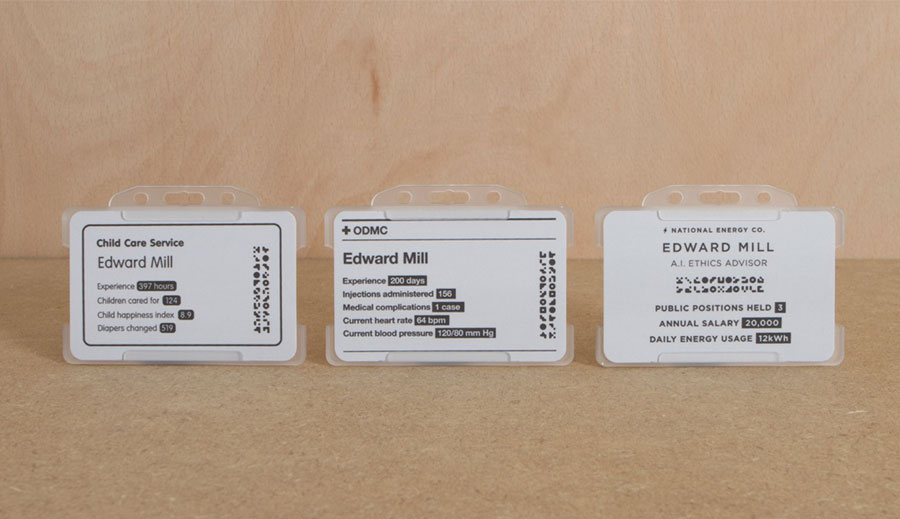
The ID card is a connected device that provides contextual information about the identity of gig-economy workers. Most citizens have more than one job, many in different industries.
As people change company and jobs, relevant live contextual information is displayed on their cards. It’s a way to prove a workers identity but also to certify their competence and expertise related to a particular job.
In this fully transparent society, an individual's rating is no longer measured by stars or comments, but through contextualised information about their experience. This high level of visibility automatically improves trust amongst strangers, especially as standard measures of expertise diminish.
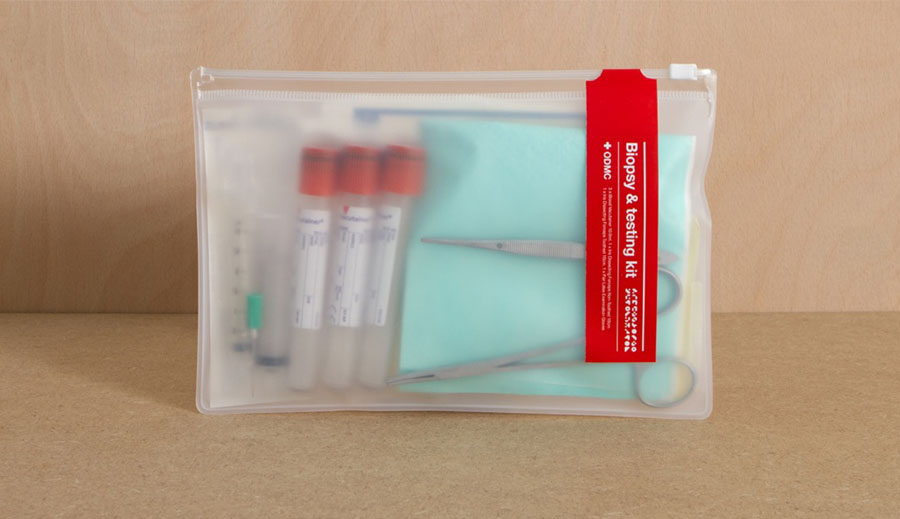
The “On Demand Medical Kit” is a hygienically sealed kit designed for a specific medical task. It’s provided to gig-economy workers by healthcare companies to simplify their work. Since many citizens now have multiple jobs, carrying around a range of tools is often required. The pre-prepared kits provide gig economy workers with the necessary tools to carry out a specific task or job.
The provision of professional-grade tools and supplies helps raise the quality and elevates delivery of care to create a more reassuring experience for the patient.
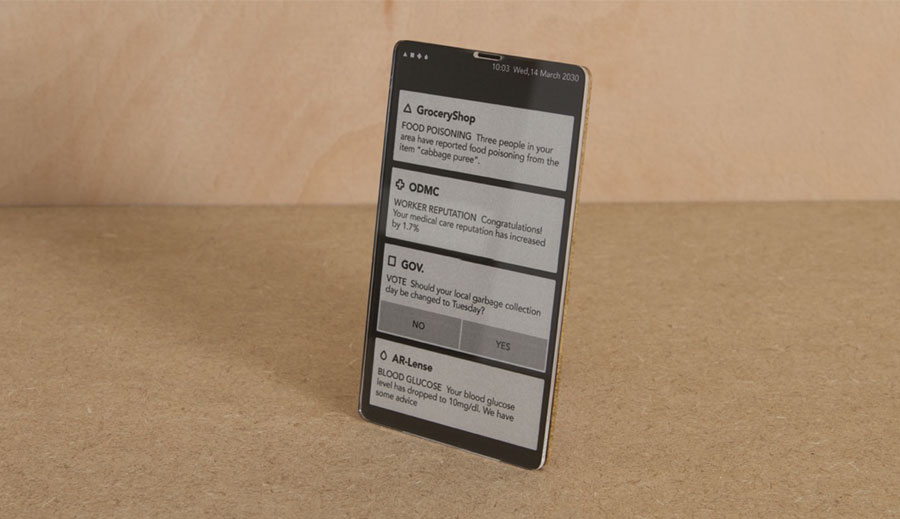
This mobile device shows various notifications from different companies and services. It tells us about the diversity of information people can receive, from updates on fluctuations in online reputation to live healthcare data provided by high-tech connected devices.
This level of data delivers transparent and easily understandable information to citizens on every aspect of their life.
A grocery shop can increase customer loyalty and trust by being transparent when something goes wrong with a product, utilising open customer data for public benefit.
Citizens use their devices to vote on a large range of local issues. This easy online voting system gives them a voice in local decision-making, improving overall trust in the government.
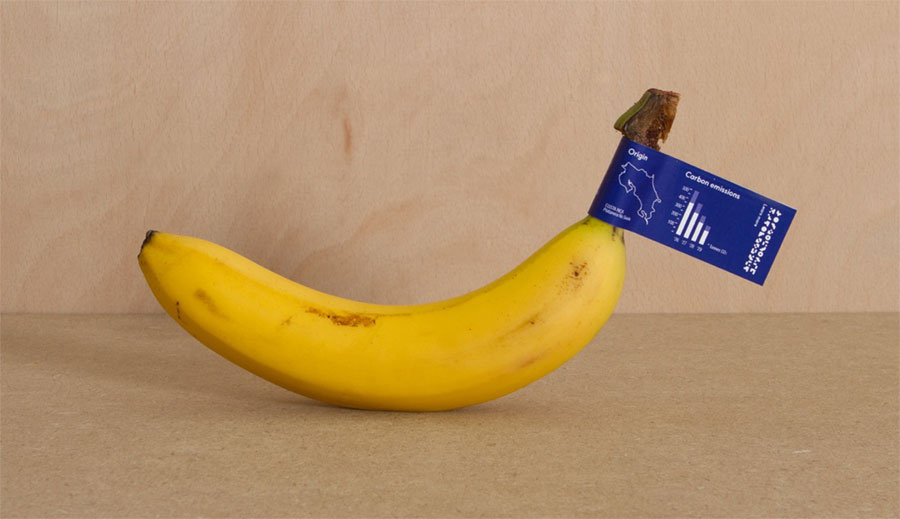
This banana label provides detailed information about the fruit. The label gives a fully transparent view into the banana’s provenance, its ingredients (down to a chemical level), its ecological impact and carbon footprint. The smart code on the side of the label links to an additional layer of information accessible with a digital tool.
Consumers want to know exactly what they are putting into their bodies and how what they eat impacts their own well-being and the environment as a whole.
Enabling consumers to feel more empowered about their purchases and consumption helps build trust in the providers and manufacturers through greater transparency and clarity of information.
With massive amounts of data available, how do you surface the most relevant contextual information?
How can open data be used for the public good?
What data points should be used to assess accreditation?
Communicating Trust with Transparency
- ID for Gig economy
How can people build one-on-one trust, in a world where they demonstrate their originality through gig work?
 Centralised & Curated
Centralised & CuratedOver the last decade(2020-2030), the government experienced a series of massive data leaks. Faith in the government’s ability to keep information secure gradually faded with each subsequent breach.
Sensing a window of opportunity, large corporations began investing in lobbying efforts to impress upon the population that they were more capable of running the country than the failing government.
Under tremendous pressure, politicians slowly began to relinquish control of key public services and undo monopoly laws.
Large companies began to merge and become even larger. Prices fell. Services became more streamlined. Life for the average citizen became less expensive and immeasurably more efficient. Brand loyalty and trust increased.
Within a year of the total repeal of monopoly laws, one corporation seemed to acquire smaller companies at a rate not seen before, until they owned virtually 90% of the market share.
They are now the go-to destination for virtually everything, from food to medical needs. The enormous amount of data they’ve acquired on individuals also means customers are served the most personalised experience possible. Products and services continue to become smarter every day.
 Centralised & Curated
Centralised & Curated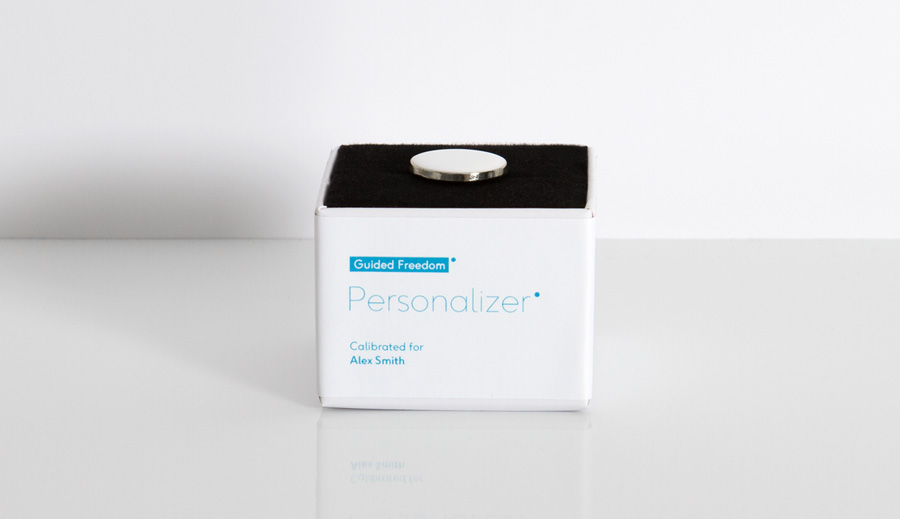
The Personalizer is a small wearable device provided by The Corporation. The device collects data on its owner, enabling The Corporation to provide personalised and tailored products and services. The device can take any particular form, depending on the wearer’s preferences. It exists as an external sign of brand loyalty that the user is proud to display.
Citizens are overwhelmed by the volume of information produced by modern society and increasingly rely on The Corporation to curate and manage their lives. To do this effectively, unconditional access to personal data is required, which The Corporation promises to keep secure.
As a result, citizens feel free to focus on the aspects of life they enjoy, trusting that The Corporation is tending to the details. Confident they are being cared for, they are able to take a more passive role in life.
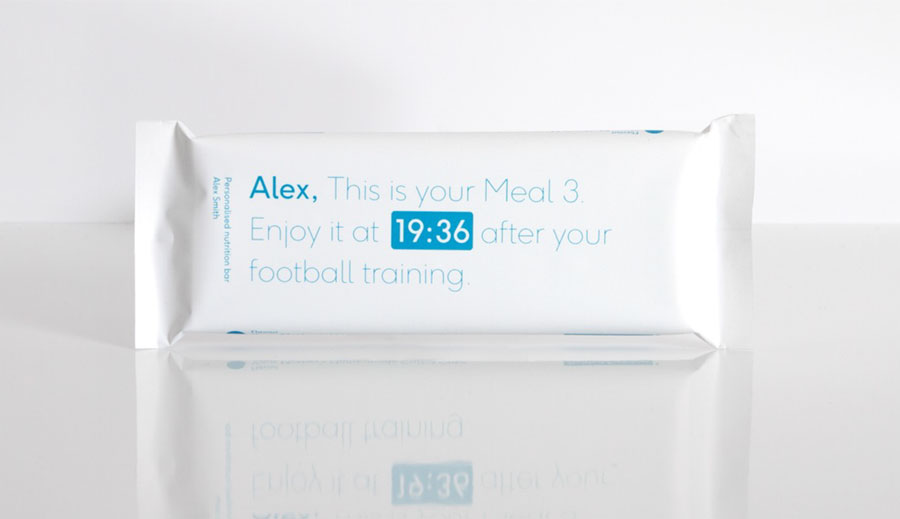
This meal replacement bar encompasses all nutritional elements needed by the user. Using personal data collected, The Corporation has calculated what the user needs to consume and, based on their schedule, when will be the optimum time to eat it. Its flavouring and taste also matches the customer’s preferences.
People lack the knowledge or the desire to understand their own body’s nutritional needs. They don’t want to spend time thinking about what to eat and when, preferring instead for The Corporation to organise it for them.
The effect is that consumers feel cared for and no longer worry about planning meals and thinking about the nutritional value of the food they eat. The comfort of receiving the perfect product, and one they actually love, helps build trust in The Corporation.
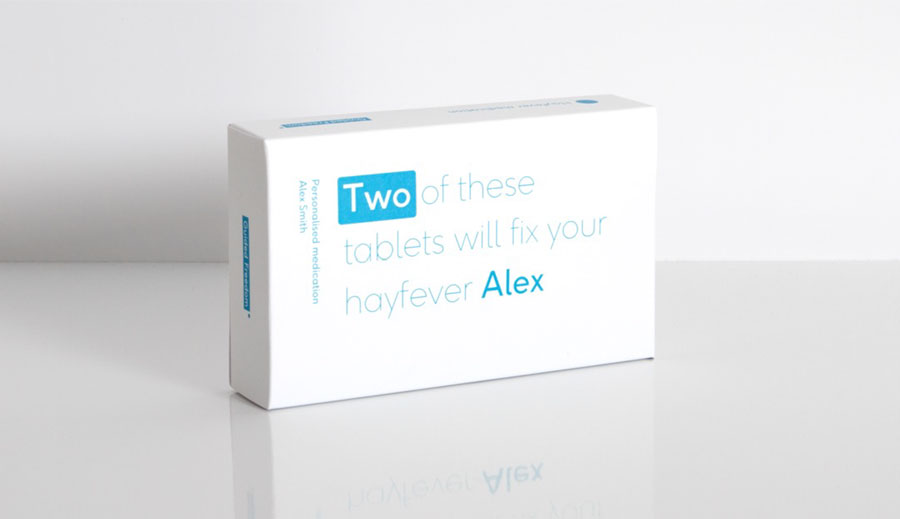
Medication in this society is simple and personalised.
The Corporation provides customers with tailored treatment, delivered precisely at the required time. Instructions and ingredients are no longer supplied with the medication as trust in The Corporation is so high that they are no longer deemed necessary.
Patients don’t have time to understand and navigate the many types of medication on offer, they just want to know what medication to take and when. Receiving ultra tailored medication based on personal data helps ensure optimum health. Patients feel cared for and don’t need to worry about their health, they trust that what The Corporation provides will be tuned to their personal needs.
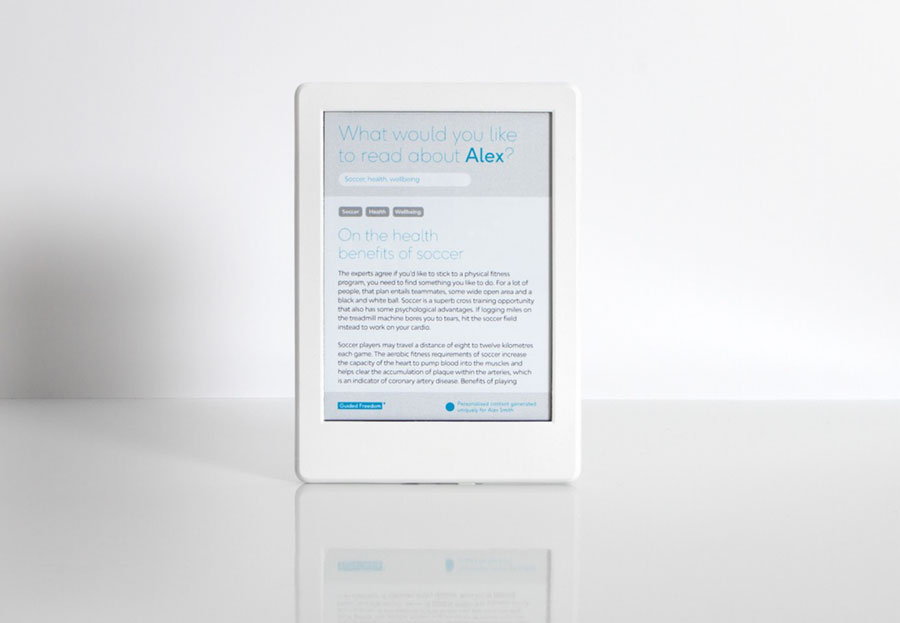
The Corporation provides AI-generated tailored content, based on the user’s personal data and preferences.
Readers input keywords and topics they are interested in to generate their own original and unique articles. Content is so highly personalised that no two users will read the exact same article.
Citizens are overwhelmed by the sheer volume of content available and are unsure which sources to trust. With limited time for reading, users want a guarantee of entertaining articles that fit their world view.
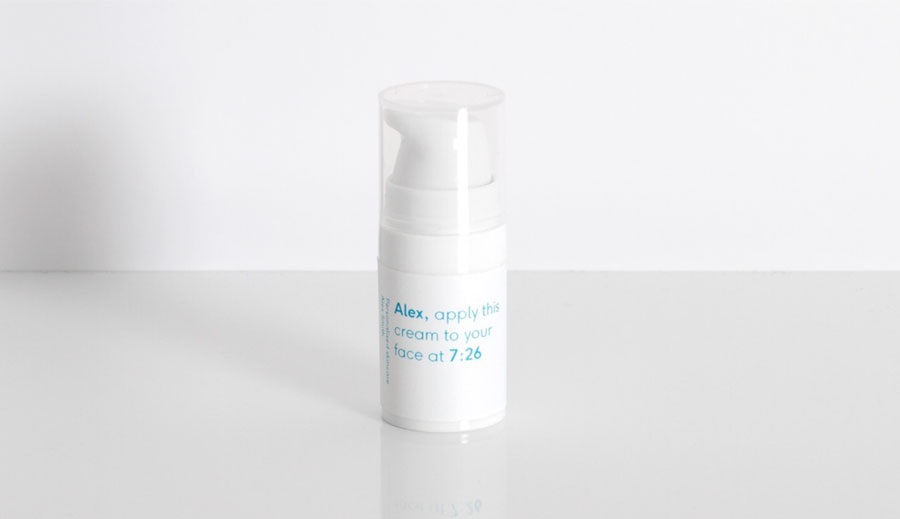
This personalised skincare product is unique and highly tailored to the user. The ingredients are based on both the user’s genetic makeup and personal lifestyle, factoring in aspects such as activities, vocation, nutrition and exposure to the sun.
Skin condition can vary depending on environmental and health factors. As a result, people don’t always use the optimum products for their specific needs at the right time. They are also overwhelmed by the number of options on the market.
With the user at the centre of the product, a high degree of product efficacy is guaranteed. Visibility of quick and tangible results helps further increase trust in The Corporation.
Where is the fine balance between helping and controlling?
What autonomy is left for the individual in a society controlled by one organisation?
How would society protect itself while relying on one organisation as a single point of failure?
 Distributed & Autonomous
Distributed & AutonomousOver the last decade(2020-2030), the government experienced a series of massive data leaks, some exposing decades of corruption. As the government began picking up the pieces of these explosive hits, large corporations, including all major banks, became the next target.
Citizens lost money, others personal data. There was no longer any sense of assurance that large institutions and infrastructures could keep information and property safe and secure.
In what could only be described as a state of panic, citizens across the country began pulling out all of their resources (or what remained of them) from banks and other financial institutions. The economy quickly took a plunge and the country fell into a deep financial crisis.
With nowhere to turn, communities began looking inward. The two paths were clear: either go it alone or self organise into small, independent communities. Without any centralised power, who else could be trusted?
Today, society is highly individualised. Citizens rely on open source projects and the trading of information and assets as currency. People learn new skills and hack together fixes for day to day problems.
Communities run their own energy grids and produce their own food.
Societal trust is generally low, except within small communities. Self reliance is high.
 Distributed & Autonomous
Distributed & Autonomous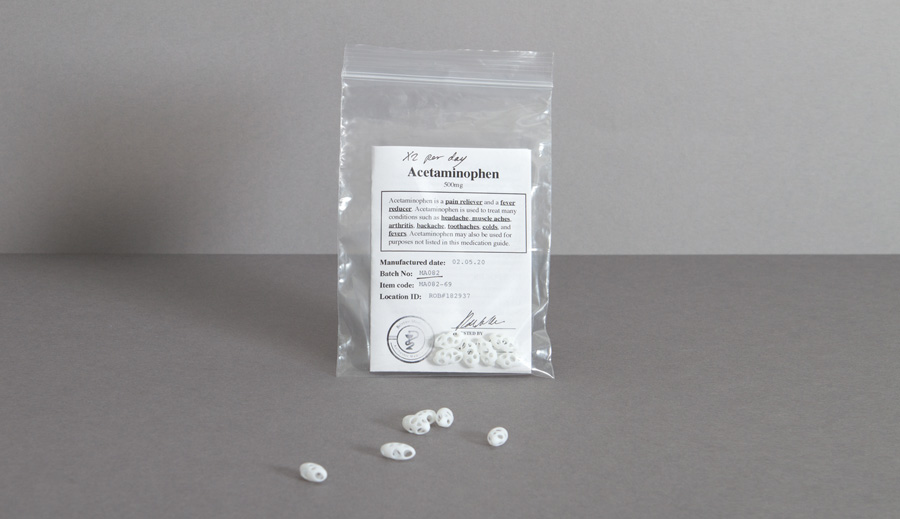
These 3D printed pills are community-made, produced by a locally certified supplier. A shift to decentralised distribution of medicine has led to local independent pharmacists becoming the predominant producer of medication.
In a world where people no longer trust large pharmaceutical companies, DIY culture and community-based medicine production has become the norm.
With trust in large organisations at an all time low, individuals and local communities have stepped forward to fill the vacuum. Local provenance and a personal relationship with the producer further increases trust.
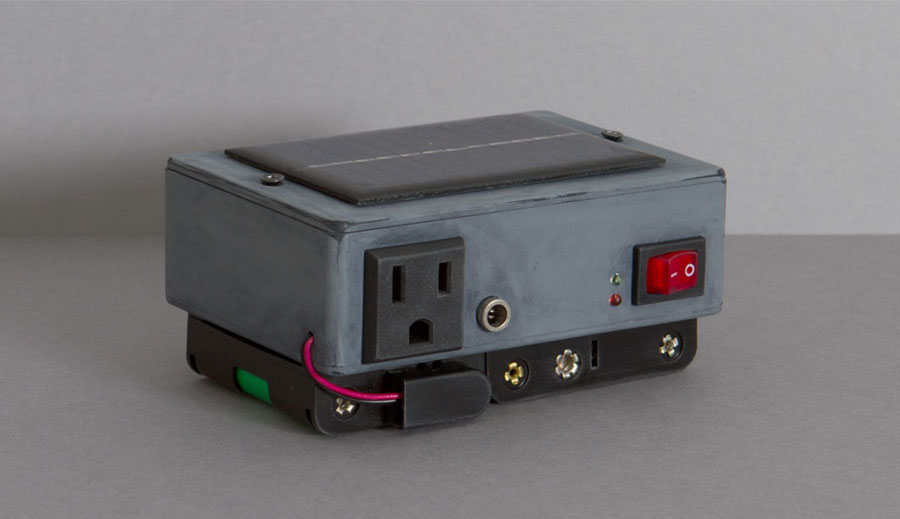
The secure network generator is a DIY solution that provides a private and secure network. Designed for a narrow community of users, robust encryption protocols prevent entities outside the network from connecting.
Citizens carefully choose the services they use to minimise the risk of hacking or information theft. With centralised networks compromised, citizens can only trust their own improvised local networks.
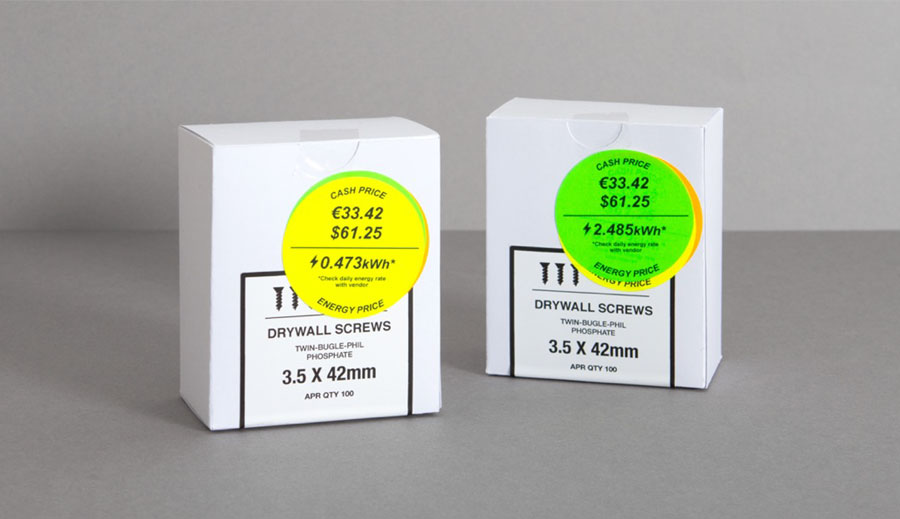
Since citizens are now able to produce their own power, energy has become a tradable commodity. Consumers can choose to buy products or services with money or energy units.
Citizens demand to know how their power has been produced and want a guarantee of clean energy sources.
The only way to ensure this is to generate their own energy on a local scale.
The cost of power changes on a daily basis depending on usage rates and environmental conditions. Price fluctuations when paying in energy credits are therefore commonplace.
The option to choose the currency with which to pay for goods affords consumers with greater control.
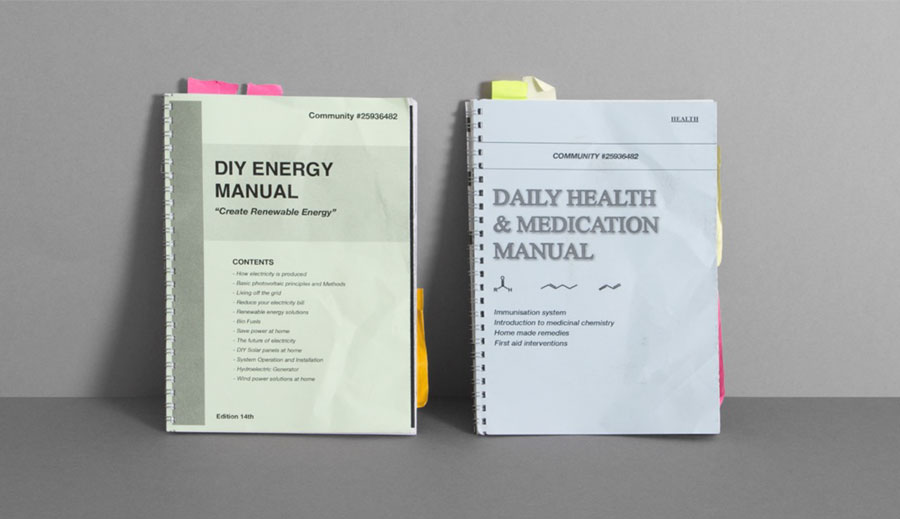
Crowdsourced user manuals are home printed community handbooks. Communities gather and share their knowledge on printed paper, ensuring they are less open to tampering and hacking than a digital equivalent.
Users need help to understand the complex systems and technology that was perviously managed for them by large organisations. Citizens carry their manuals with them at all times to ensure their safekeeping.
The manuals are a common effort, knowledge is collected and curated by trusted parties over time. Notes are kept in the margins which may then get added to the next edition.
Users gain new knowledge which allows for more self sufficiency. Knowledge is handed from citizen to citizen building trust in the community.
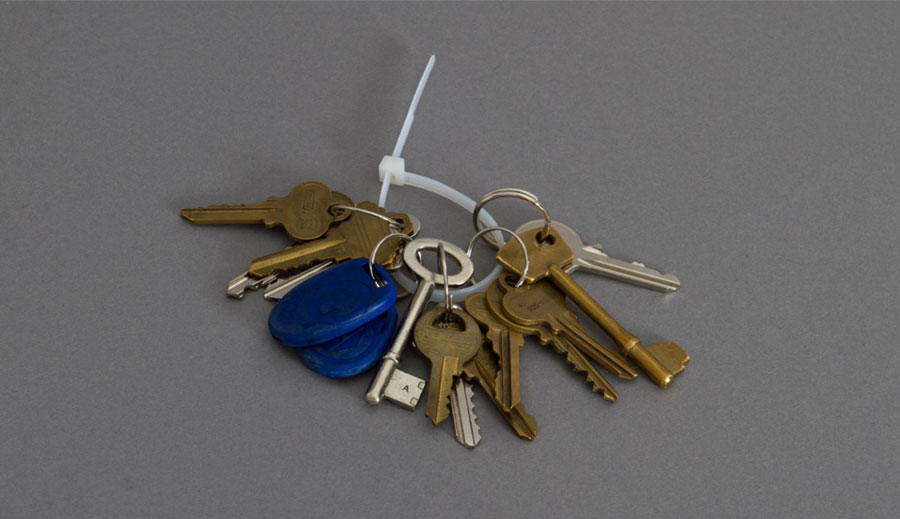
A set of traditional keys allows access to physical spaces and generates secure gateways to trusted networks and connected services.
A general lack of trust between people and institutions has led to a feeling of insecurity and prompted people to safeguard their goods in alternative ways. They have reverted to more traditional physical mechanisms in a time when digital security is not guaranteed.
How can people find credible sources of information and reliable communities?
What purpose can organisations serve in this society? How can they rebuild public trust over time?

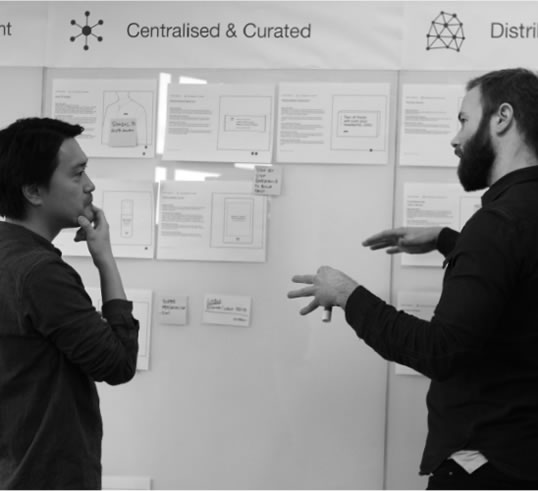
This project is a collaboration between Hitachi and Method, a leading global design firm based in London, New York and San Jose. Based on a global research performed by Method, designers from the two companies worked together to explore the role of trust in the future.
